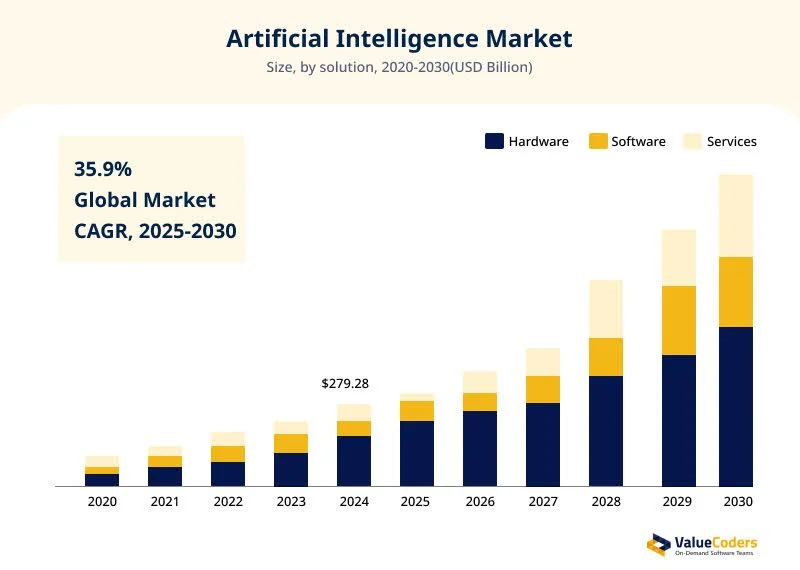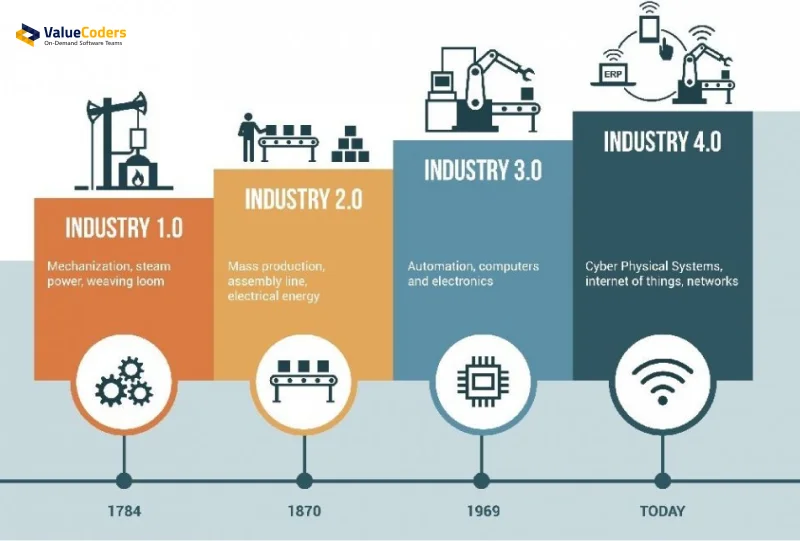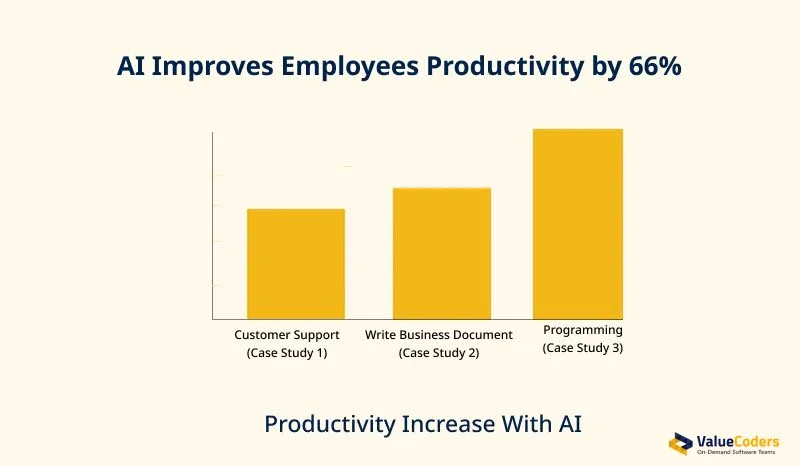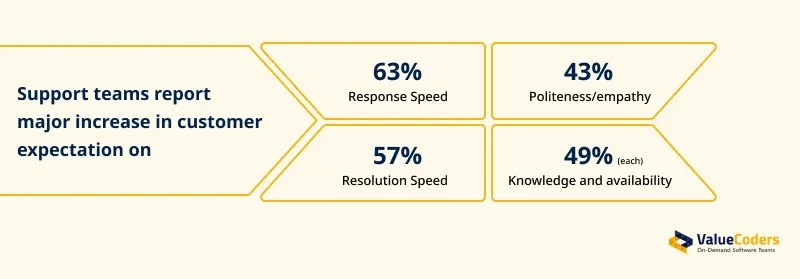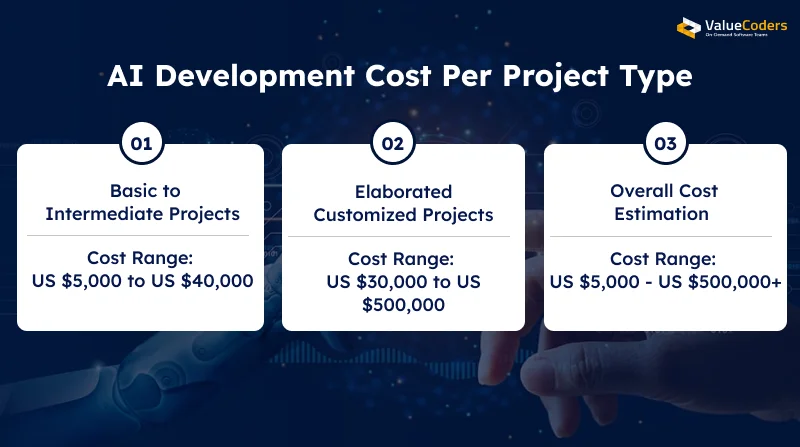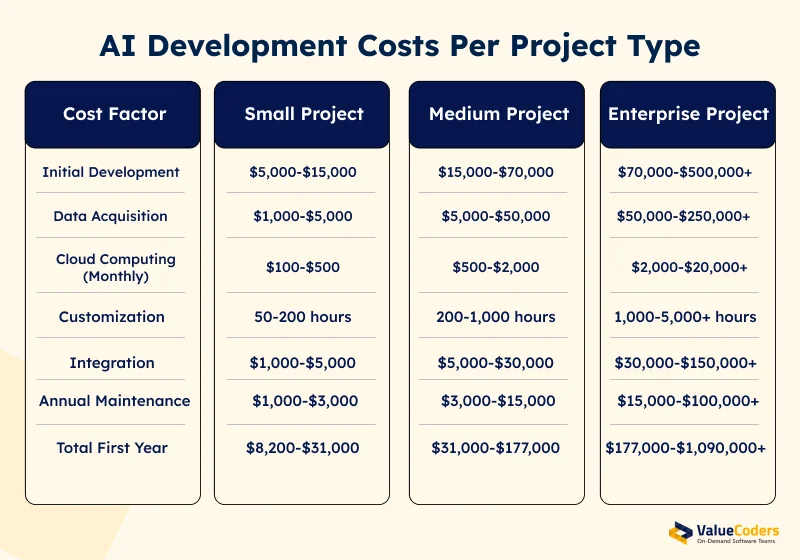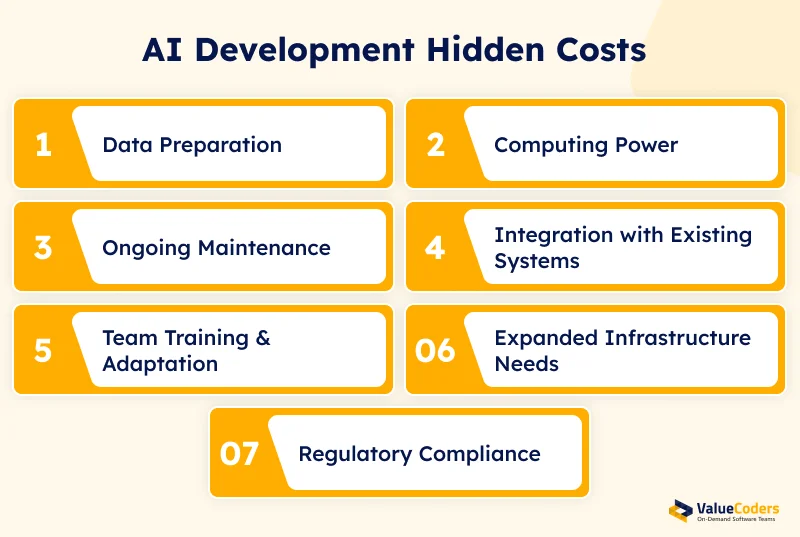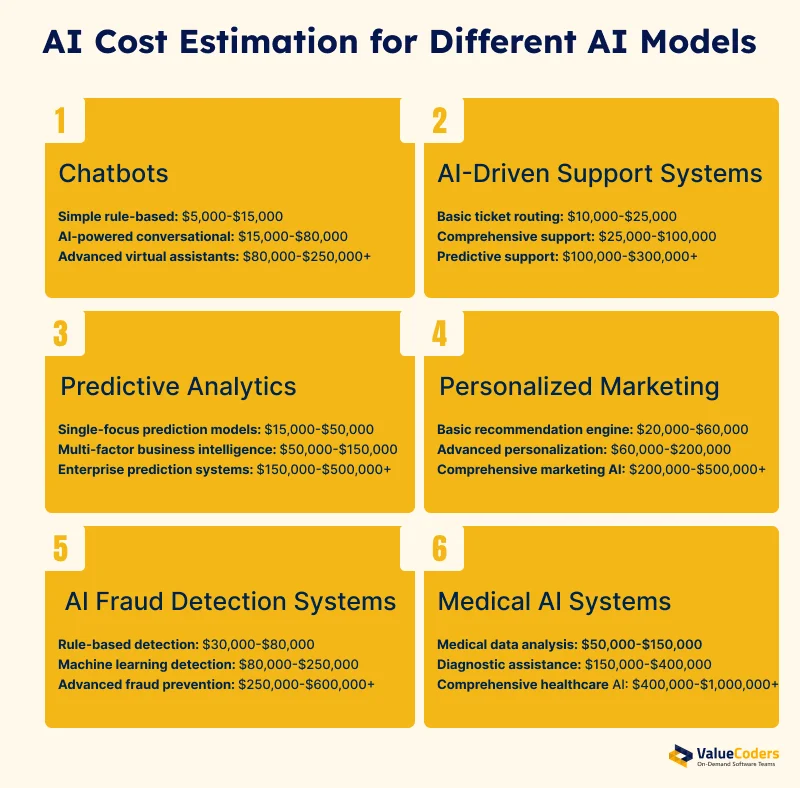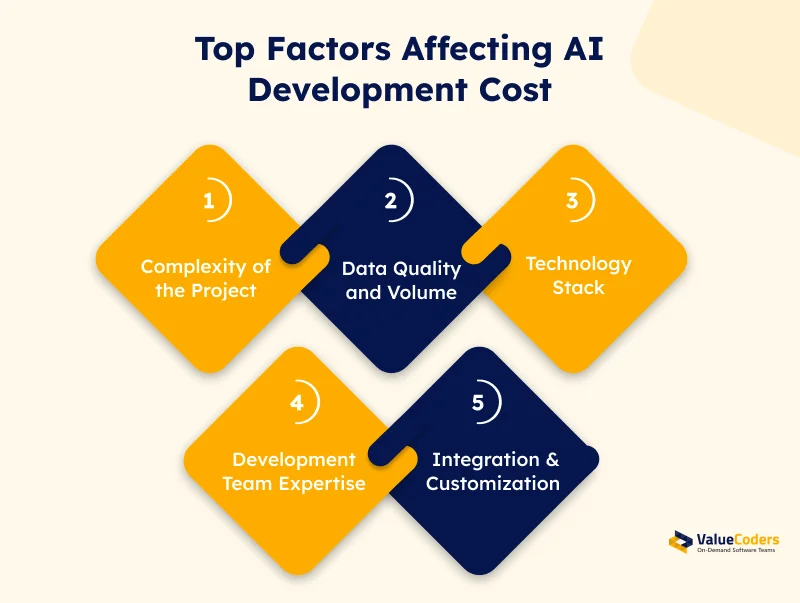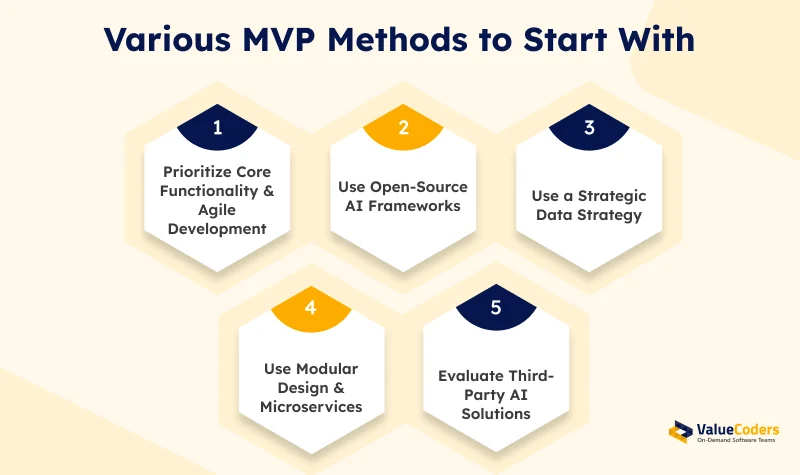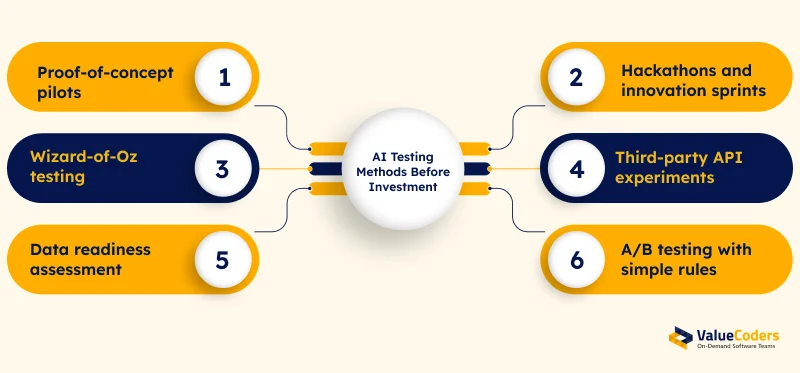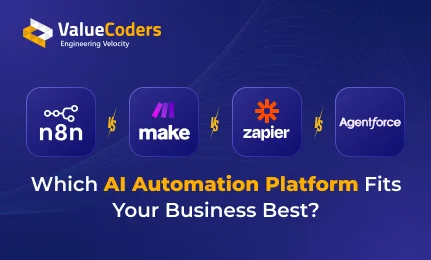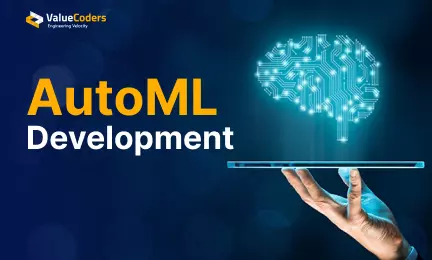Are you planning to start with AI development in this cognitive age?
Then, you must be curious about the AI development cost.
According to a Grandviewresearch report, the global AI market will grow at a CAGR of 35.9% from 2026 to 2030. Hence, there is more chance of big growth over the next decade.
From food/furniture shopping to medical consultation, every business vertical is quickly adapting AI. However, the costs and complexities of developing AI systems often remain unclear.
This lack of transparency could lead to delayed projects, budget overruns, and disappointed expectations.
Let’s explore the actual AI development cost, project types, hidden expenses, and compare various AI applications to test AI capabilities.
Avoid hidden costs and missteps. Know what you're really signing up for.
Top Reasons Why to Invest in AI
Modern businesses face growing pressure to operate faster, smarter, and more efficiently. Investing in intelligent automation helps meet these demands while unlocking new growth opportunities.
1. Improved Efficiency
AI systems excel at handling repetitive tasks that would otherwise require hours of human work. By using computer vision, natural language processing, and machine learning, businesses can:
- Process documents automatically instead of manually reviewing each one
- Sort and categorize data without human intervention
- Handle basic customer inquiries without staff involvement
- Detect patterns too subtle for humans to notice quickly
Example
A manufacturing company might use AI to spot defects on the production line with 99% accuracy, catching issues human inspectors might miss due to fatigue or distractions.
It may lead to reduced waste in the production process.
2. Greater Productivity
When routine tasks get automated, team members can focus on work that truly requires human skills:
- Creative problem-solving tasks receive more attention
- Complex customer issues get resolved faster
- Staff can develop new skills instead of doing repetitive work
- Teams can handle larger workloads without adding headcount
Example
A marketing team using AI tools to handle basic content creation and data analysis might produce twice as many campaigns with the same staff. The team members spend less time on spreadsheets and more time on strategy and creative direction.
3. Enhanced Customer Experience
Today’s customers expect quick responses, personalized service, and around-the-clock availability. AI helps deliver on these expectations:
- 24/7 customer support through chatbots
- Personalized recommendations based on past behavior
- Faster resolution of common problems
- More consistent service quality
Example
An online retailer implementing AI-powered product recommendations might see a 30% increase in average order value while simultaneously reducing the number of returns due to better product matching to customer preferences.
Also Read: 20+ Best AI Development Companies To Get Innovative And Tech-Driven Solutions
An Overview of AI Development Cost As per Project Types
The cost of building intelligent systems can differ significantly depending on what you’re trying to achieve. From chatbots to fraud detection, each use case brings its own pricing curve. This will ultimately help in effective AI budget planning.
1. Basic to Intermediate Projects
Cost Range: US $5,000 to US $40,000
At this price range, businesses can expect:
- Pre-built AI models adapted to specific needs
- Basic chatbots with limited conversation abilities
- Simple data analysis tools
- Limited customization options
These projects rely heavily on existing frameworks and APIs, with minimal custom development. They work well for standard use cases like basic customer service automation, simple predictive models, or entry-level data sorting systems.
Explore AI development costs and see if the ROI makes it worth it.
2. Elaborated Customized Projects
Cost Range: US $30,000 to US $500,000
Mid-range projects involve more custom development:
- Custom-trained models specific to your business data
- Advanced chatbots with complex conversation flows
- Detailed predictive analytics systems
- Integration with multiple existing business systems
These solutions address business challenges and require significant data preparation and model training. Examples include industry-specific prediction tools, advanced customer segmentation systems, or customized recommendation engines.
3. Overall Cost Estimation
Cost Range: US $5,000 – US $500,000+
The higher end of the scale ($500,000+) represents enterprise-level AI development with:
- Completely custom AI algorithms
- Complex systems handling multiple AI functions
- Large-scale data processing capabilities
- Advanced security and compliance features
These systems include autonomous decision-making tools for financial institutions, complex healthcare diagnostic assistants, or advanced manufacturing optimization systems.
A Complete Breakdown of AI Development Costs
Understanding where your money goes is key to planning a successful tech initiative. Here’s a complete AI investment analysis of costs across stages from design to deployment.
1. Initial Investments
Hardware Requirements
- Development workstations: $2,000-$5,000 per developer
- Server cost of training AI models: $5,000-$50,000 (if not using cloud services)
- Specialized AI processors (if needed): $10,000-$100,000+
Software Needs
- Development frameworks and tools: $0-$20,000 (many are open-source)
- Licensed software components: $5,000-$50,000
- Third-party APIs: $500-$10,000 monthly
Data Acquisition
- Purchasing datasets: $1,000-$100,000+
- Data collection systems: $5,000-$50,000
- Data labeling services: $0.05-$5 per data point (potentially thousands or millions of points)
2. Operational Costs
Cloud Computing Fees
- Training costs: $500-$10,000+ per model training session
- Inference/running costs: $100-$5,000+ monthly
- Scaling costs as usage grows: Variable based on traffic
Data Storage
- Cloud storage: $20-$500+ per terabyte monthly
- Database management: $100-$2,000+ monthly
- Backup systems: $50-$1,000+ monthly
API Access Fees
- Third-party AI services: $0.0001-$0.50 per API call
- Volume-based pricing tiers: Often decreasing cost per call with volume
- Minimum monthly commitments: Often $100-$1,000+
3. Development and Personnel Costs
AI Experts
- Data Scientists: $80,000-$200,000+ annual salary
- Expert AI Engineers: $90,000-$180,000+ annual salary
- Hourly consultant rates: $150-$500 per hour
Project Management
- Project Manager: $70,000-$150,000+ annual salary
- Documentation specialists: $60,000-$120,000+ annual salary
- Quality assurance team: $60,000-$130,000+ annual salary
Development Tools
- Project management software: $10-$50 per user monthly
- Code repositories: $4-$21 per user monthly
- Testing frameworks: $0-$5,000+ monthly
Also Read: How Can Generative AI Help in Building Cost Reduction Strategies?
4. Maintenance
Model Updates
- Regular retraining: $1,000-$10,000+ per major update
- Performance monitoring: $500-$5,000+ monthly
- Algorithm refinement: Requires ongoing expert time
Bug Fixes and Security
- Security audits: $5,000-$50,000+ annually
- Bug fixes: Typically 15-20% of initial development costs annually
- Compliance updates: Variable based on industry requirements
What Are the Hidden Costs in AI Development?
Many businesses underestimate the full scope of AI development costs. Some hidden expenses to consider include:
Data Preparation
Raw data is rarely usable as-is. Cleaning, labeling, and structuring data take time and resources. This step alone can consume 60-80% of a data scientist’s time on a project, yet it’s often not adequately budgeted for.
Computing Power
Training AI models, especially deep learning, requires significant processing power, often running on cloud-based GPUs or specialized hardware. A single complex model might cost $5,000-$30,000 in computing resources just for training.
Hire from our top 1% AI talent pool and access enterprise-grade development at startup-friendly rates.
Ongoing Maintenance
AI models needs continuous updates to stay relevant, especially if user behavior or data patterns change over time. Without regular maintenance, model accuracy degrades, a phenomenon known as “model drift”—potentially rendering the entire system less useful over time.
Integration with Existing Systems
These incur additional costs, such as potential hardware upgrades and software compatibility challenges. If the quality and availability of data are lacking, costs can increase significantly due to additional time and resources needed to set up a proper AI infrastructure.
Team Training & Adaptation
Getting your team comfortable with new AI tools requires time and potentially formal training. This productivity dip during adoption is rarely factored into initial budgets but can affect your bottom line.
Expanded Infrastructure Needs
As AI systems succeed and usage grows, infrastructure costs can escalate quickly. What starts as a modest cloud computing bill can grow substantially as more users engage with your AI system.
Regulatory Compliance
Depending on your industry, AI systems may need to meet specific regulatory standards. Healthcare AI, financial services AI, and any systems handling personal data face particular scrutiny and compliance requirements.
Artificial Intelligence Cost Estimation for Various AI Models
Not all Artificial Intelligence solutions are priced the same. This section compares the typical cost range for different models based on purpose, complexity, and industry needs.
Chatbots
Simple rule-based: $5,000-$15,000
- Limited responses based on keywords
- No learning capabilities
- Basic customer service functions
AI-powered conversational: $15,000-$80,000
- Natural language understanding
- Learning from conversations
- Handling complex requests
Advanced virtual assistants: $80,000-$250,000+
- Multi-language support
- Integration with business systems
- Personality and brand voice alignment
AI-Driven Support Systems
Basic ticket routing: $10,000-$25,000
- Automatic categorization of support requests
- Priority assignment
- Simple response suggestions
Comprehensive support: $25,000-$100,000
- Automatic resolution of common issues
- Customer sentiment analysis
- Performance analytics and reporting
Predictive support: $100,000-$300,000+
- Identifying potential problems before customers report them
- Personalizing support based on customer history
- Integration with product development feedback loops
Predictive Analytics
Single-focus prediction models: $15,000-$50,000
- Sales forecasting
- Inventory management
- Basic customer behavior prediction
Multi-factor business intelligence: $50,000-$150,000
- Cross-department data integration
- Multiple prediction models working together
- Custom reporting and dashboards
Enterprise prediction systems: $150,000-$500,000+
- Real-time prediction adjustments
- Handling massive datasets
- Complex multi-variable scenarios
Personalized Marketing
Basic recommendation engine: $20,000-$60,000
- Product recommendations based on past purchases
- Email content customization
- Simple A/B testing capabilities
Advanced personalization: $60,000-$200,000
- Multi-channel content personalization
- Behavioral analysis and targeting
- Customer journey optimization
Comprehensive marketing AI: $200,000-$500,000+
- Predictive customer lifetime value
- Automated campaign optimization
- Real-time personalization across all touchpoints
AI Fraud Detection Systems
Rule-based detection: $30,000-$80,000
- Flagging transactions based on preset rules
- Basic pattern recognition
- Alert systems for manual review
Machine learning detection: $80,000-$250,000
- Learning from past fraud cases
- Adaptive rule creation
- Reducing false positives over time
Advanced fraud prevention: $250,000-$600,000+
- Real-time transaction screening
- Behavioral biometrics
- Network analysis for fraud ring detection
Medical AI Systems
Medical data analysis: $50,000-$150,000
- Patient record analysis
- Treatment outcome prediction
- Research data processing
Diagnostic assistance: $150,000-$400,000
- Medical image analysis
- Symptom-based diagnosis suggestions
- Treatment recommendation support
Comprehensive healthcare AI: $400,000-$1,000,000+
- Personalized treatment planning
- Drug discovery assistance
- Hospital resource optimization
Also Read: Creating A Solid AI Strategy For 2026 And Beyond
Key Factors Influencing the Cost of AI Development
Several moving parts affect how much an AI project will cost. From team structure to data quality and tool selection, here’s what really drives the final price tag.
Let’s have a look at the top AI deployment cost factors below:
1. Complexity of the Project
The more complex your AI needs, the higher the cost:
- Simple classification tasks cost less
- Multi-step decision making raises costs
- Novel problems without existing solutions cost most
2. Data Quality and Volume
Data is the foundation of AI success:
- Using existing clean datasets reduces costs
- Creating new datasets adds significant expense
- Larger training data requirements increase computing costs
3. Technology Stack
Your choice of technologies impacts costs:
- Open-source frameworks can reduce software costs
- Specialized hardware requirements increase expenses
- Proprietary systems often cost more than standard options
4. Development Team Expertise
Who builds your AI matters:
- Junior developers take longer, potentially increasing costs
- Experienced AI specialists command higher rates but work faster
- Mixed teams offer cost-efficiency for many projects
5. Integration & Customization
How your AI connects to existing systems affects costs:
- Standalone AI systems cost less to implement
- Integration with legacy systems adds complexity
- Custom interfaces and security requirements increase expenses
Learn the real cost of AI and what affects your ROI.
Is AI Development Cost-Effective for Small Businesses?
Yes, but only if it’s implemented strategically.
Small businesses should start with AI solutions that offer immediate value, such as automating repetitive processes, improving customer support, or optimizing marketing campaigns.
Many AI tools are now available as APIs or SaaS platforms, making them accessible without a heavy upfront investment.
However, a fully custom AI model is a big commitment, so weighing long-term benefits against costs is important. So, you must use smart approaches including:
- Starting with ready-made AI solutions before custom development
- Focusing on problems with measurable financial impact
- Planning for gradual AI adoption rather than immediate transformation
- Partnering with specialists rather than building in-house teams
Measuring ROI from AI Investments
A small business investing $50,000 in an AI customer service solution might see:
- 30% reduction in support staff time ($60,000 annual savings)
- 15% improvement in customer satisfaction (reducing churn worth $40,000)
- 10% increase in upsell opportunities ($25,000 additional revenue) Total first-year benefits: $125,000 against $50,000 investment plus $10,000 maintenance ROI = ($125,000 – $60,000) / $60,000 = 108% first-year return
Top Ways to Test AI Before Fully Investing
Before committing to full AI development, consider these testing approaches:
Proof-of-concept pilots
- Develop a minimal version that tests only core features
- Run with a subset of data or users
- Set clear success metrics before starting
- Budget: $5,000-$25,000
Hackathons and innovation sprints
- Challenge internal or external teams to build prototypes
- Set time limits (1-3 days) to force practical solutions
- Evaluate multiple approaches simultaneously
- Budget: $2,000-$15,000
Wizard-of-Oz testing
- Simulate AI responses with human operators
- Test user reactions without building technology
- Refine requirements based on real interactions
- Budget: $1,000-$8,000
Third-party API experiments
- Test capabilities using existing AI services
- Measure potential impact before custom development
- Compare multiple services to inform requirements
- Budget: $500-$5,000
Data readiness assessment
- Evaluate existing data quality and quantity
- Identify gaps before committing to model development
- Test basic predictive power of available data
- Budget: $3,000-$20,000
A/B testing with simple rules
- Compare rule-based automation to current processes
- Measure improvement before adding machine learning
- Establish baseline metrics for future comparison
- Budget: $2,000-$10,000
Also Read: What Are The Top AI Software Development Tools?
Conclusion
AI development represents a significant investment that ranges from $5,000 for basic implementations to $500,000+ for complex enterprise solutions. The wide price range reflects different AI projects’ varying complexity, data requirements, and integration needs.
When evaluating costs, remember to account for ongoing expenses beyond initial development. However, whether to invest in AI depends entirely on your specific business needs, existing technical infrastructure, and strategic goals.
We are a leading AI development company in India, with 5200+ projects delivered to clients globally. We specialize in:
- Custom AI solutions
- Generative AI Development
- Predictive models
- Natural language processing apps
- Computer vision systems
If you are planning to deploy AI in your next project, feel free to contact ValueCoders.


